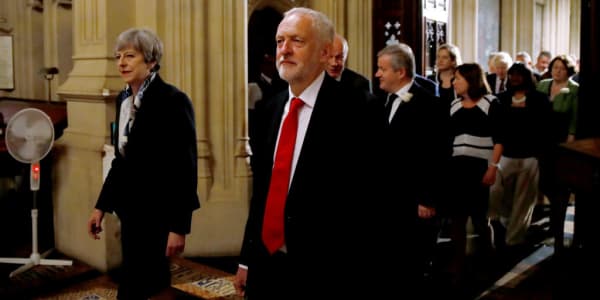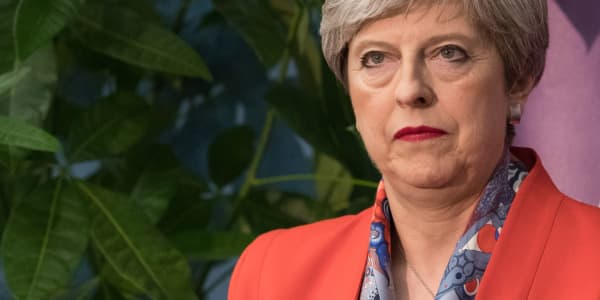Last Thursday, the country went to the polls to take part in voting for a new government, with the results released overnight. The ruling Conservative Party won 317 seat in the U.K. parliament, making it the largest political party in the lawmaking chamber. Their rivals, the Labour Party, secured 262.
However, this was less than the 325 seats required to form a majority government. One week on, the country still remains in a state of uncertainty as the Conservative Party negotiates to put a government together.
While the results have been regarded as a shock by the Conservative party, prime minister Theresa May is trying to keep hold of her position. Earlier this week, May apologized to her fellow Conservative politicians, called the 1922 committee, telling them "I'm the person who got us into this mess and I'm the one who will get us out of it," according to a Bloomberg report on Monday.
May is expected to remain in the role at least until the U.K. formally exits the European Union in March 2019 as leader of the Conservative party, according to Mikael Olai Milhøj, senior analyst at Danske Bank.
"The reason is that the 1922 committee does not want to increase political uncertainty further by throwing the party into a new leadership contest – political uncertainty is already high as the Brexit clock is ticking," he said in a research note published Tuesday.
Following the results, the Conservatives have been negotiating a deal with 10 politicians from the Democratic Unionist Party (DUP) from Northern Ireland in order to form a workable government.
These talks will either result in a coalition government with the DUP, meaning they may have roles in the ruling government, or the Conservatives will form a minority government, with backing from the DUP on a "confidence and supply basis," which means the DUP politicians will vote in favor of the Conservative policies, but likely in return for policy concessions.
So far, no deal has yet been made between the Conservatives and the DUP. Talks have been delayed, due to events such as the fire which engulfed a tower block in London earlier in the week. Representatives from both parties have been in talks on Thursday, but have yet to agree on a deal, according to reports from Sky News citing sources.
Meanwhile, a Conservative source told Reuters talks with the DUP have been very positive and constructive so far with broad agreement on some principles, but they are not putting a time frame on when a deal will be done. This indicates the Conservatives may go ahead with forming a minority government without securing the deal first.
There is technically a deadline for a government to be formed. The U.K. monarch was meant to perform the state opening of parliament and deliver the Queen's Speech, which is written by the government and outlines the legislative agenda for the future, on June 19. This has now been rescheduled to June 21, according to the Press Association news agency citing the Conservative's Andrea Leadsom, leader of the lower house of parliament.
Official Brexit negotiations between the U.K. and the European Union are expected to start on June 19 but according to some media reports EU's deputy Brexit negotiator Sabine Weyand is meeting U.K. officials to work out whether Brexit talks can start on schedule next week. The U.K. has only until 29 March 2019 to settle its divorce bill from the EU and negotiate its future trading relationship with continent.
This political uncertainty, as well as fears of another general election if the Conservatives fail to gain the DUP's support, is expected to damage consumer and business confidence, according to Dean Turner, economist at UBS.
"This will come as the established trends of rising inflation and weak growth in household incomes are already weighing on the economy," he said in research note published Wednesday.
"Thus, the slowdown in the economy seen in the first quarter of this year is likely to persist for some time; if anything there is likely some downside risk to our already below-consensus forecast."
In financial markets, the rose to 7,527.33 on June 8, on expectations that the Conservatives would secure a majority in election, but this has since dropped 1.7 percent to 7,392.99. Meanwhile, has fallen 1.64 percent against the dollar over the same period, from a high $1.2951 last Thursday to around $1.2738, although this has been buffed by Thursday's Bank of England decision.
On the back of the political uncertainty, safe-haven demand has driven down the yield on benchmark U.K. 10-year gilts from 1.033 percent at the start of June 8, to 0.93 percent at the end of Wednesday. It's currently up almost 9 basis points to 1.019 percent, due to the BOE decision. , but 3 members of the 8 person policy committee voted to increase rates by 25 basis points.





